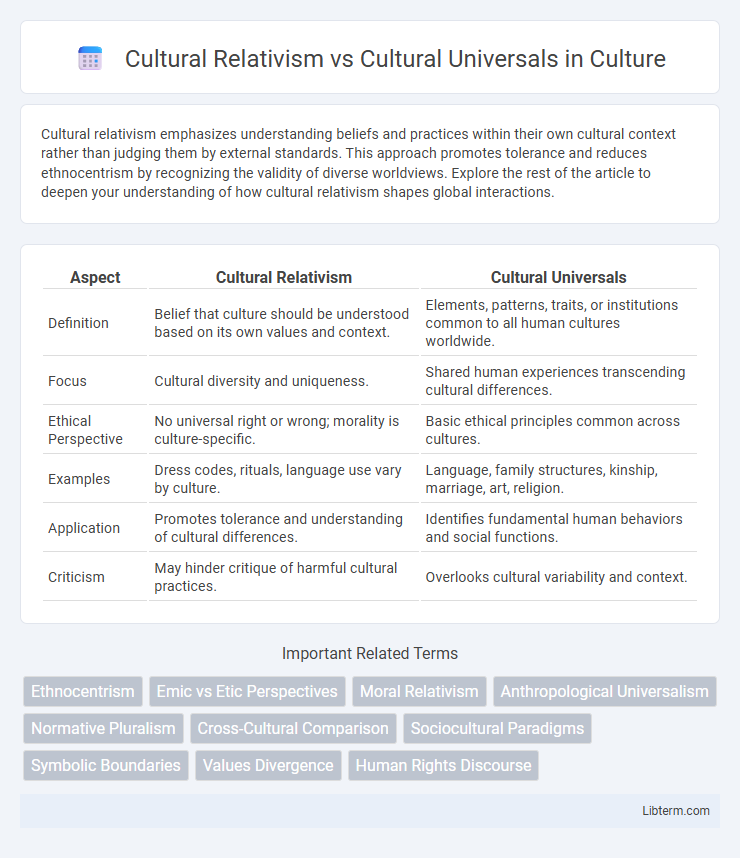Cultural relativism emphasizes understanding beliefs and practices within their own cultural context rather than judging them by external standards. This approach promotes tolerance and reduces ethnocentrism by recognizing the validity of diverse worldviews. Explore the rest of the article to deepen your understanding of how cultural relativism shapes global interactions.
Table of Comparison
| Aspect | Cultural Relativism | Cultural Universals |
|---|---|---|
| Definition | Belief that culture should be understood based on its own values and context. | Elements, patterns, traits, or institutions common to all human cultures worldwide. |
| Focus | Cultural diversity and uniqueness. | Shared human experiences transcending cultural differences. |
| Ethical Perspective | No universal right or wrong; morality is culture-specific. | Basic ethical principles common across cultures. |
| Examples | Dress codes, rituals, language use vary by culture. | Language, family structures, kinship, marriage, art, religion. |
| Application | Promotes tolerance and understanding of cultural differences. | Identifies fundamental human behaviors and social functions. |
| Criticism | May hinder critique of harmful cultural practices. | Overlooks cultural variability and context. |
Understanding Cultural Relativism
Cultural relativism emphasizes understanding beliefs and practices within the context of a specific culture, rejecting ethnocentric judgments. It advocates evaluating customs based on cultural norms rather than external standards, promoting empathy and reducing cultural bias. This approach contrasts with cultural universals, which identify behaviors or traits common across all human societies despite cultural differences.
Defining Cultural Universals
Cultural universals are elements, patterns, traits, or institutions common to all human cultures worldwide, such as language, family structures, and religious practices. These universals serve as a framework for understanding shared human experiences, transcending individual cultural differences. Defining cultural universals helps anthropologists identify fundamental aspects of human behavior that exist regardless of cultural relativism.
Key Differences Between Relativism and Universals
Cultural relativism asserts that moral codes and social norms are valid only within specific cultural contexts, emphasizing diversity in values and practices across societies. Cultural universals refer to elements, patterns, traits, or institutions common to all human cultures, such as language, kinship, or art, suggesting underlying human commonalities. The key difference lies in cultural relativism promoting understanding and assessment of behaviors within cultural frameworks, whereas cultural universals highlight shared aspects that transcend cultural differences.
Historical Perspectives on Culture
Historical perspectives on culture reveal that cultural relativism emphasizes understanding societies within their unique contexts, challenging ethnocentric views dominant in early anthropology. In contrast, cultural universals identify common elements such as language, kinship, and rituals present across all human societies, reflecting shared human experiences throughout history. The tension between these approaches shaped 20th-century debates, influencing methodologies in cultural anthropology and promoting more nuanced interpretations of cultural diversity.
Social Implications of Cultural Relativism
Cultural relativism emphasizes understanding beliefs and practices within their own cultural contexts, which fosters tolerance and reduces ethnocentric judgments in multicultural societies. It challenges the imposition of universal moral standards, allowing diverse social norms related to gender roles, family structures, and religious rituals to coexist. However, this perspective can complicate efforts to address human rights violations globally, as cultural practices deemed acceptable in one society might conflict with international ethical principles.
Examples of Cultural Universals Across Societies
Cultural universals are elements, patterns, traits, or institutions common to all human cultures worldwide, such as language, family structures, and rituals surrounding birth and death. Examples include the use of music for social bonding, the presence of taboos related to food and mating, and the role of art and storytelling in education and cultural transmission. These universals highlight shared human experiences despite vast cultural differences, contrasting with cultural relativism, which emphasizes understanding behaviors within specific cultural contexts.
Critiques and Limitations of Cultural Relativism
Cultural relativism faces critiques for potentially enabling moral relativism, where harmful practices may be justified under the guise of cultural norms. Its limitation lies in the challenge of addressing universal human rights, as strict cultural relativism can hinder the condemnation of practices like gender discrimination or violence. Balancing respect for cultural diversity with the enforcement of universal ethical standards remains a central tension in anthropology and ethics.
The Role of Cultural Universals in Global Ethics
Cultural universals such as justice, kinship, and ritual provide foundational ethical principles that transcend individual societies, enabling dialogue and cooperation across diverse cultures. These shared elements serve as a basis for global ethics by establishing common ground for rights, responsibilities, and moral expectations despite cultural differences. Identifying and respecting cultural universals facilitates the development of international human rights frameworks and global ethical standards that promote mutual understanding and coexistence.
Balancing Respect and Critique in Cross-Cultural Encounters
Balancing respect and critique in cross-cultural encounters involves acknowledging cultural relativism, which promotes understanding practices within their cultural contexts, while recognizing cultural universals that highlight shared human experiences. This balance requires critical evaluation of harmful customs without imposing ethnocentric judgments, preserving cultural dignity alongside advocacy for human rights. Effective intercultural dialogue relies on empathy, open-mindedness, and ethical reflexivity to navigate tensions between respecting diversity and addressing moral concerns.
Future Trends in Culture Studies: Relativism vs Universals
Future trends in culture studies increasingly emphasize the dynamic interplay between cultural relativism and cultural universals, highlighting how global interconnectedness fosters both the preservation of unique cultural identities and the recognition of shared human experiences. Advances in digital anthropology and cross-cultural research methodologies enhance understanding of localized practices while identifying universal patterns in social behavior, language, and ethics. Emerging frameworks aim to balance respect for cultural diversity with the development of inclusive policies that acknowledge fundamental human rights across all societies.
Cultural Relativism Infographic

 libterm.com
libterm.com